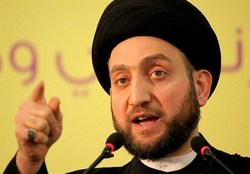 Iraqi Shia cleric and the leader of the National Wisdom Movement says his fellow countrymen and women reject both a permanent foreign military base on Iraq’s territory and the deployment of foreign combat forces to the Arab country.
Iraqi Shia cleric and the leader of the National Wisdom Movement says his fellow countrymen and women reject both a permanent foreign military base on Iraq’s territory and the deployment of foreign combat forces to the Arab country. RNA - “Iraq is a sovereign state, not a subordinate or subjugated one. In this sense, we say no to foreign military bases, to foreign combat forces, to foreign missions, to unilateral provocations, or to attacks on neighboring countries from the Iraqi territory and airspace,” Ammar al-Hakim said during a Saturday ceremony marking the 16th death anniversary of senior Iraqi Shia Muslim cleric and political leader Ayatollah Mohammad Baqir al-Hakim, who was assassinated in 2003 in the city of Najaf.
He added, “There is an attitude that wants Iraq to be entrenched and a prisoner of interests and narrow ideas.”
“And there is another that wants the country to perform its natural role in the (Middle East) region and decide its own fate. This will not come true unless we build a strong and independent state plus efficient institutions in accordance with a unified national strategy,” he added.
“Let us work together to build a strong and capable state, an independent, stable and prosperous Iraq. Let us work together to develop the existing political system. Systems that do not respond to reforms are doomed to failure,” Hakim pointed out.
During a meeting with Jeanine Hennis- Plasschaert, the special UN chief’s representative for Iraq and the head of the UN Assistance Mission for Iraq (UNAMI), in Najaf on February 6, Iraq's top Shia cleric Grand Ayatollah Ali al-Sistani fiercely criticized a statement by US President Donald Trump that American forces must remain in Iraq so Washington can keep a close eye on neighboring Iran.
Ayatollah Sistani said Iraq rejected serving as a launching pad to harm any other country.
He noted that Iraq aspired to have good and balanced relations with all neighboring countries, without interference in their internal affairs.
The remarks came a day after Iraqi Prime Minister Adil Abdul-Mahdi strongly condemned Trump’s comments, stressing that his country would not accept being used for any acts of aggression against other states.
Earlier, Iraqi President Barham Salih had hit back at the US president, saying, “The Iraqi constitution rejects the use of Iraq as a base for hitting or attacking a neighboring country.”
According to Press TV, he said Trump had not asked Iraq's permission for US troops stationed there to “watch Iran.”
In an interview with CBS television network broadcast on February 3, Trump highlighted the importance of a military base in Iraq, saying it was crucial to the surveillance of Iran’s activities.
“We spent a fortune on building this incredible base, we might as well keep it. And one of the reasons I want to keep it is because I want to be looking a little bit at Iran” he said in an apparent reference to Ayn al-Asad Airbase in western Iraq, which he visited during an unannounced trip to the country last December.
When asked whether he planned to use US forces in Iraq to “strike” Iran, Trump responded, “No… all I want to do is be able to watch.”
847/940